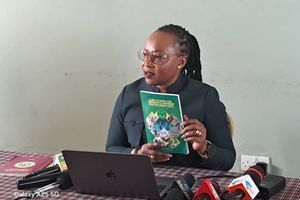Experts warn of improper drug use contributing to AMR risks

A specialist in emergency diseases from the Aga Khan Hospital, Dr Hussein Manji, speaks during a workshop that brought together health professionals, and stakeholders about Antimicrobial Resistance (AMR) organised by the Aga Khan Hospital. PHOTO|COURTERSY
What you need to know:
- As Antimicrobial Resistance (AMR) is predicted to become the leading global cause of death by 2050, experts are urging Tanzanians to avoid improper drug use practices to mitigate this looming crisis.
Dar es Salaam. As Antimicrobial Resistance (AMR) is predicted to become the leading global cause of death by 2050, experts are urging Tanzanians to avoid improper drug use practices to mitigate this looming crisis.
According to the World Health Organization (WHO), AMR currently causes 1.2 million deaths annually, with projections suggesting that by 2030, this number could rise to 10 million deaths per year.
AMR occurs as a result of improper drug usage, including not adhering to prescribed instructions, stopping medications prematurely once symptoms subside, taking drugs without proper medical guidance, and a lack of awareness about the importance of vaccinations that can help prevent diseases and reduce the need for medications.
A pharmacist from the Aga Khan Hospital, Mr Richard Charles, highlighted these points during a workshop to raise awareness about AMR among health professionals.
The workshop held on Thursday, November 28, 2024, is part of the global AMR Awareness Week, which runs from November 28 to December 4 each year.
“AMR is also exacerbated by the unavailability of essential medicines, especially in remote areas, which often leads to incomplete courses of treatment. The indiscriminate use of drugs in animals, livestock, and other organisms further contributes to the spread of AMR,” explained Mr Charles.
The event brought together different stakeholders in the health sector including doctors, laboratory professionals, and pharmacists, to emphasize that AMR is not only a national concern but a global one, requiring coordinated action across all sectors.
“The fight against AMR calls for unity, as this year’s theme emphasises: ‘Educate the community, take action, and participate fully to ensure sustainable efforts,’” added Mr Charles.
Discussing the potential consequences of AMR, he stressed the severe impacts, such as increased home fatalities, prolonged hospital stays, and soaring medical costs that can push families into poverty.
“We believe that through collaboration between the government, development partners, the private sector, strong infection prevention systems, improved laboratory capabilities, and timely access to medicines, we can effectively combat AMR,” he said.
The Tanzania Medicines and Medical Devices Authority (TMDA) Regional Manager for the Eastern Zone, Mr Adonis Bitegeko, noted that the workshop has played a crucial role in educating professionals on the ongoing efforts to address AMR.
Mr Bitegeko emphasised that TMDA ensures only high-quality, registered medicines enter the country, safeguarding against ineffective treatments that could lead to drug resistance. He also mentioned that regular inspections are carried out to prevent the spread of AMR among users.
In addition to these efforts, the government has launched campaigns like ‘Holela-Holela Itakukosti’ (Careless Use of Drugs Will Cost You), which encourage the public to seek advice from healthcare professionals before taking medication.
These initiatives aim to raise awareness about the dangers of improperly used drugs, including the risk of recurring infections, prolonged healing times, the spread of drug-resistant pathogens, and even disabilities.




